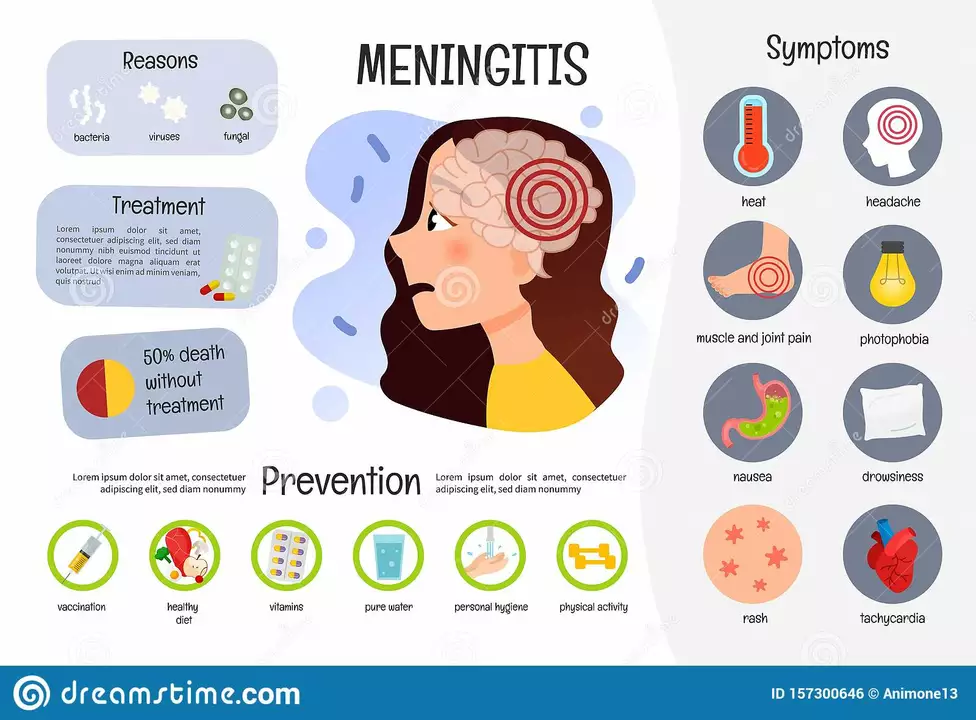Bacterial meningitis: urgent signs, treatment, and prevention
Bacterial meningitis is a serious infection of the membranes around the brain and spinal cord. It starts fast and can be life threatening within hours. Knowing early signs and acting quickly saves lives.
Watch for high fever, severe headache, neck stiffness, sensitivity to light, vomiting, or confusion. Babies may show poor feeding, irritability, a bulging soft spot, or limpness. If someone has sudden fever and stiff neck, treat it like an emergency.
Call emergency services or go to the nearest hospital right away. Do not wait for test results if a doctor suspects bacterial meningitis. Early antibiotics given in hospital reduce the risk of severe complications.
In hospital, doctors will do a physical exam, blood tests, and usually a lumbar puncture to check spinal fluid. Treatment commonly includes intravenous antibiotics and sometimes steroids to lower inflammation. Supportive care may involve fluids, oxygen, and monitoring in intensive care.
Common bacterial causes include Neisseria meningitidis, Streptococcus pneumoniae, and Haemophilus influenzae type b. Which germ causes the illness can shape treatment and public health steps like antibiotics for close contacts.
Vaccines prevent many cases. Meningococcal, pneumococcal, and Hib vaccines cut risk for different age groups. Ask your doctor which shots you, your kids, or teens need based on age, health, and local guidelines.
People with weakened immune systems, recent head injury, or who live in group settings like dorms have higher risk. Newborns and the very old also face greater danger. If you or someone in a high risk group has symptoms, act fast.
Recovery times vary. Some people leave hospital in days if treated early. Others need weeks of rehab for hearing loss, learning problems, or limb weakness. Ask the care team about follow up tests like hearing checks and physical therapy.
If someone at home has confirmed bacterial meningitis, health officials may recommend antibiotics for close contacts. Good hygiene helps: cover coughs, wash hands, avoid sharing utensils and drinks. Don't delay talking to public health if a neighbor or classmate is sick.
Signs that need immediate attention include sudden confusion, seizures, high fever, severe drowsiness, or a rash that doesn't fade when pressed. If you suspect bacterial meningitis, tell the dispatcher about neck stiffness and mental changes so they know to hurry.
Quick lowdown
Bacterial meningitis is fast, serious, and needs hospital care. Key signs: fever, severe headache, stiff neck, light sensitivity, confusion. Babies may be irritable or feed poorly. Immediate antibiotics save lives. Vaccines prevent many cases. Close contacts sometimes need preventive antibiotics. Ask about meningococcal and pneumococcal shots.
When to call a doctor
Call emergency services now for sudden fever with stiff neck, confusion, severe headache, or seizures. Tell them how fast symptoms started, any recent infections, vaccination status, and if the person lives in a group setting. If you're the contact of a confirmed case, ask public health about antibiotics and watch for fever for several days. Keep young children and infants away from sick people until public health gives guidance or until a doctor clears them safely.
The use of ampicillin in treating bacterial meningitis
I recently came across some interesting information about the use of ampicillin in treating bacterial meningitis. Ampicillin is an antibiotic that is highly effective in targeting a wide range of bacteria responsible for causing meningitis. It works by inhibiting bacterial cell wall synthesis, which ultimately leads to the bacteria's death. In many cases, ampicillin is used in combination with other antibiotics to increase the chances of successful treatment. It's important to remember that early diagnosis and prompt treatment with antibiotics like ampicillin are crucial in managing bacterial meningitis and preventing severe complications.
Keep Reading
